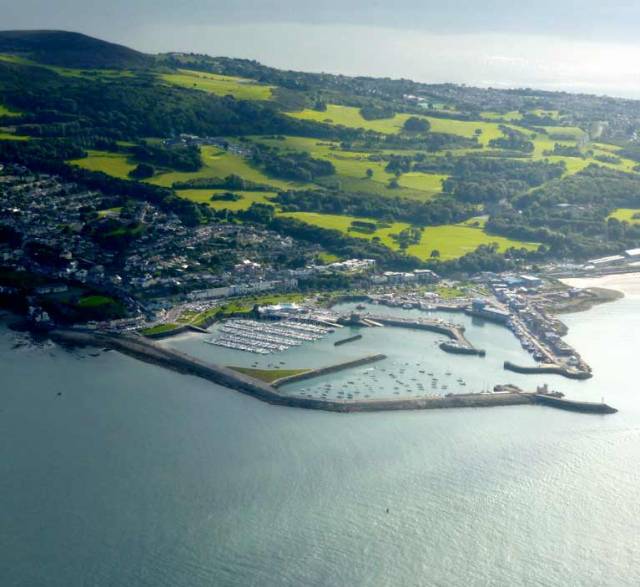A successful new development in the national sailing programme will inevitably be something of a revolution. Yet if those managing the event handle it in the right way, the changeover can take place without people thinking that anything really revolutionary – in the sense of a sudden and complete change – has taken place. W M Nixon takes a look at the successful unveiling of the new-style Wave Regatta planned for his home port of Howth for next year’s June Bank Holiday Weekend.
Preparation is everything. Quiet work behind the scenes in trying to visualize every practical and administrative glitch which might arise, and how best to deal with it well before it becomes a problem, is essential. Getting key people – decision-makers and can-do people, local, regional and national – firmly on side, is absolutely essential.
Testing the waters of consumer opinion with trial announcements and proposals, and the occasional test run maybe disguised as something else, is also part of the process. Yet revealing too much of what is taking shape before it is really ready to go public can do more harm than good.
Thus when Howth Yacht Club’s Wave Regatta 2018 was unveiled after a crisp and businesslike Annual General Meeting in the clubhouse on Thursday night, not only was it a very complete and appealing concept in itself, but it emerged fully formed, and in a style well presented to an audience filled with fresh enthusiasm.
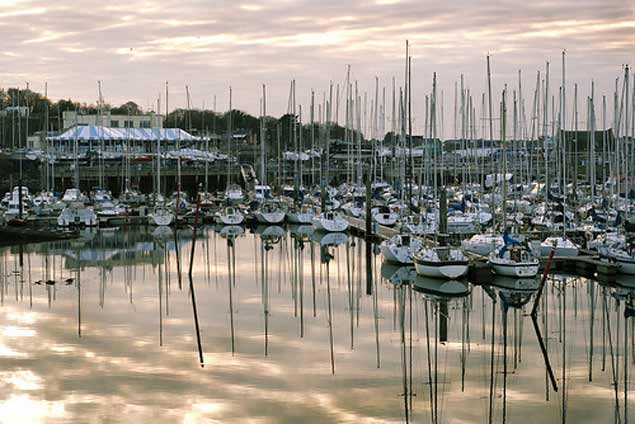 Howth’s modern marina/clubhouse complex (above) is in stark contrast to the situation pre-1987 (below) when the ISORA racers and the fishing fleet had to share the same small space. The boat at centre is the famous S&S-designed Sunstone (Tom & Vicky Jackson) which in her racing days with ISORA was known as Dai Mouse III.
Howth’s modern marina/clubhouse complex (above) is in stark contrast to the situation pre-1987 (below) when the ISORA racers and the fishing fleet had to share the same small space. The boat at centre is the famous S&S-designed Sunstone (Tom & Vicky Jackson) which in her racing days with ISORA was known as Dai Mouse III.
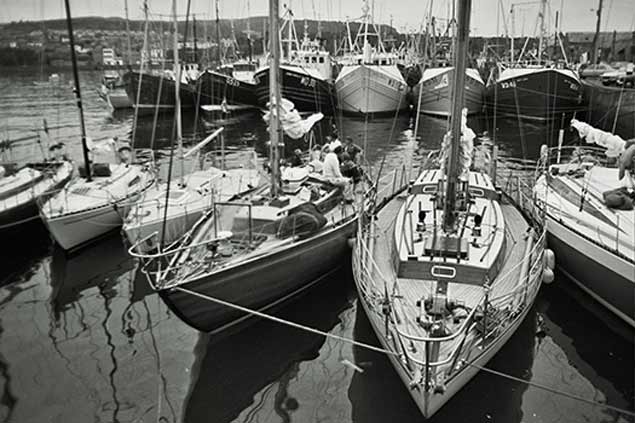
After all, Commodore Joe McPeake had just finished chairing an AGM whose mood was enthusiastic after the publication of a set of figures which showed that the huge extra voluntary effort and support which the club has received from many of its members during the past 18 months has paid real dividends. While the improving mood had become increasingly apparent as the season progressed, by Thursday night if you could somehow have linked it to the National Grid, you’d have lit the village with it.
Inevitably, Howth gets compared to the big southside clubs of Dun Laoghaire, and the way their huge reservoir of personnel resources - further augmented by the overall administration of Dublin Bay Sailing Club, and with the large marina run as a commercial venture – frees up a enormous pool of talent to keep a high-powered show on the road. For when all is said and done, only Dun Laoghaire - with its unique selection of stately shoreside facilities - could stage an event like the Volvo Dun Laoghaire Regatta.
But in Howth, the one club has to do everything. So instead of trying to rival Dun Laoghaire, today’s Howth sailors see their strength in being themselves in their own special peninsular port, which is neither Dublin nor northside nor remotely southside. On the contrary, it’s emphatically part of Fingal. And it’s indisputably Eastside. On top of all that, as its basic geology is twice as old as anywhere nearby, it is Ireland which is the add-on to Howth, rather than the other way round.
However, that’s not in anyone’s mind in Howth at all this weekend, as we realize the leap of the imagination which has transformed some long-established Howth events by combining them with new concepts, and then steering the whole package into a significant gap in the market which had been hidden there in plain sight for all to see.
For the overall shape of the 2018 National Sailing Programme is unusual. The biennial Volvo Round Ireland Race from Wicklow has been shifted to the last weekend of June, presumably because its time-honoured slot right on the mid-summer weekend around June 23rd would have clashed with the finish of the Volvo Ocean Race itself in The Hague at the same time.
So with the Volvo Round Ireland on June 30th, Volvo Cork Week in its turn was moved back to July 16th to 21st. And while those who seek a fun regatta with holiday overtones have Calves Week in Schull from August 7th to 10th, those in pursuit of racing with recognised national titles at the end of it have the ICRA Nationals at Galway from 15th to 18th August.
What it meant to those in Howth was that there wasn’t a major cruiser-racer championship on Ireland’s East Coast for the entire season, and particularly not in June and early July when the heavies generally expect an event of this type. But that realisation came after they’d already set in motion a project to re-invigorate their traditional Lambay Race, which has been staged annually since at least 1904 and maybe earlier.
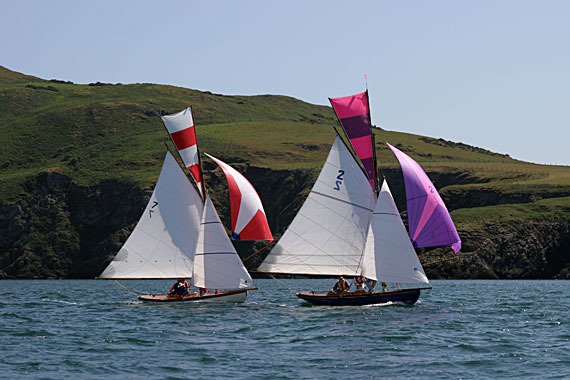 The classic Lambay Race. Howth 17s Aura and Pauline racing along the coastline of Ireland’s most unspoilt island. Photo John Deane
The classic Lambay Race. Howth 17s Aura and Pauline racing along the coastline of Ireland’s most unspoilt island. Photo John Deane
In times past, with smaller craft such as the 1898-established Howth 17s (happily still with us, and stronger as a class than ever), simply racing round the island of Lambay from Howth was enough for a long day’s race. But with newer and much bigger craft joining the mix, all sorts of ways had to be found to increase the length of the Lambay Race for the big boats, while retaining its character. Yet by this stage, the programme generally was becoming crowded, with the revival of ISORA posing new problems of rival events.
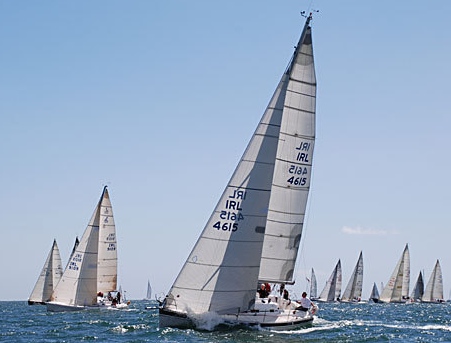 Cruiser-racers in the Lambay Race. Todays faster boats expect a longer race than the traditional 16-mile course
Cruiser-racers in the Lambay Race. Todays faster boats expect a longer race than the traditional 16-mile course
A partial solution was reached this year when the ever-obliging ISORA Chairman Peter Ryan agreed to incorporate the annual Lambay Race as the main section of an ISORA Race which would start with the Lambay fleet and sail through its course and finish line, but then race on to a finish in Dublin Bay to provide the kind of distance ISORA expects.
However, for 2018, the Lambay Race on Saturday June 2nd will be a fully-fledged ISORA event in its own right. But it will literally be a Lambay-Race-With-Knobs-On for the Cruiser-Racer classes, as the organisers are planning a morning start and probably taking in Rockabill and the Kish to provide a perfect miniature offshore course.
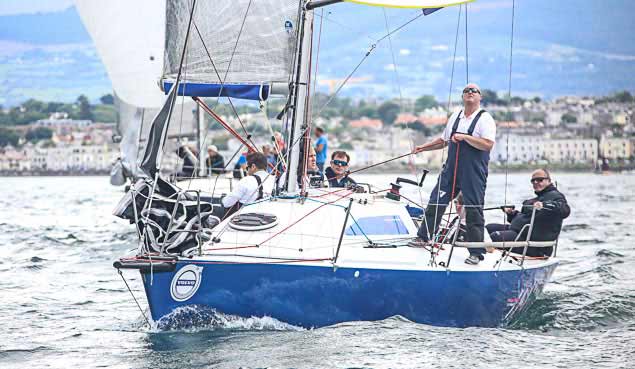 Dave Cullen, Director of Racing for the Wave Regatta, on the tiller of his classic Half Tonner Checkmate XV. Photo: Afloat.ie/David O’Brien
Dave Cullen, Director of Racing for the Wave Regatta, on the tiller of his classic Half Tonner Checkmate XV. Photo: Afloat.ie/David O’Brien
Having the full ISORA imprimatur on this extended Lambay Race provides the new Wave Regatta with the massive corner-stone which enables the Organising Committee, chaired by former HYC Commodore Brian Turvey, to build a full three-day programme around it, for they can be confident that local One Design Classes such as the Puppeteer 22s and the Howth 17s will already be doing the Lambay Race in its traditional form. As well, Sportsboat Classes like the SB20s and the 1720s will also have the option of a start. And if the IRC Class divisions are made in the right way, we’ll have the J/109s, the J/80s and the J/24s racing as classes-within-classes to add that bit of extra zing.
As the possibilities became clearer, one extra bit of information encouraged the Howth group to go for it big time in promoting an event with three days of solid racing as a viable biennial alternative to the Volvo Dun Laoghaire Regatta. This was the news that, in future, in every even year the annual ICRA Nationals will be staged at a non-Dublin venue – August’s Galway venue is the start of this process.
This meant that the Howth team really had to get their skates on in order to have a realistic proposition and programme in place in time for an official unveiling at Thursday’s HYC AGM on December 14th. Even with test runs on various aspects of the main idea during the past couple of seasons, the actual countdown time was short enough, but by Thursday night such a complete package could be put on display that they were able to tell us that Fingal County Council were giving major support, there was every encouragement from the Harbour Authority, and HYC member Michael Wright had come on to the Committee to act as shoreside hospitality director, while also bringing in the support of his Wright Hospitality Group.
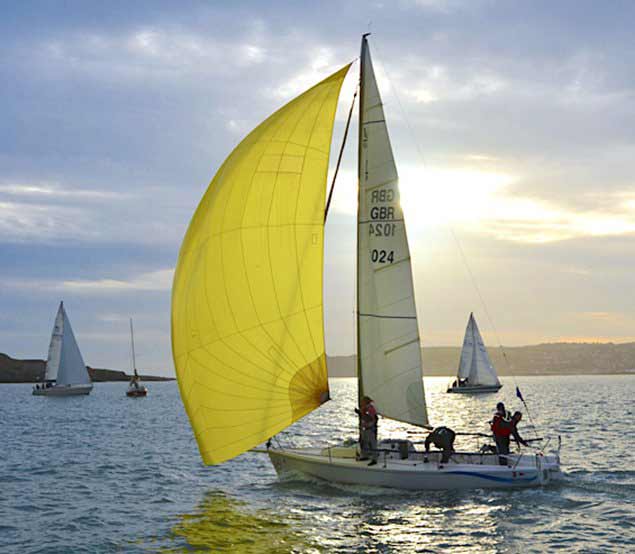 One of HYC’s club-owned J/80s in Howth Sound. With an additional club-owned flotilla from the Royal St George YC, the IRC-compliant J/80s will have a choice of options for Wave Regatta
One of HYC’s club-owned J/80s in Howth Sound. With an additional club-owned flotilla from the Royal St George YC, the IRC-compliant J/80s will have a choice of options for Wave Regatta
In fact, these days with its proliferation of characterful restaurants and hospitality hotspots, Howth’s shoreside entertainment is soon in place. So it’s the programme afloat which has to match it, and here the organisers have hit the target by having Irish Sailing President Jack Roy take on the role as one of the senior Race Officers, another being former President David Lovegrove. Howth-based Race Officers such as David Lovegrove and Harry Gallagher have long made a major input into Volvo Dun Laoghaire Regatta, so all these top men afloat are accustomed to working with each other in the most demanding situations.
They’re also accustomed to inter-acting with the “customers” after racing, and it was their reports of overseas visitors to the Dun Laoghaire Regatta expressing a wish to take part in some sort of major event in the Greater Dublin area every year which encouraged the Howth team to think that, with proper planning, they could provide an alternate biennial regatta which would be different from Dun Laoghaire, yet express the same mood of good but not too serious sport afloat, and high-powered entertainment ashore, with an emphasis on attracting younger participants.
 Irish Sailing President Jack Roy will be a Race Officer at Howth’s new event
Irish Sailing President Jack Roy will be a Race Officer at Howth’s new event
Flexibility is the approach. For those who wish to do just the Lambay Race on the Saturday, that’s fine. But for those who want the Full Irish of a really good programme of sport, there’ll be three races on Friday 1st June, and three more on Sunday June 3rd, while the Bank Holiday Monday will be given over to a Family Day which was very popular in 2017, and will be further developed next year.
As with everything to do with sailing in Ireland, the weather factor will be considerable. But for those of us who have done more than a few Lambay Races, the good memories linger best, and they’re of an effortless regatta atmosphere with an element of local pride, for it’s the coast of Fingal we’ve been racing along, one of all Ireland’s finest islands we’ve been racing round, and it’s our own home port under the hill that we’ve raced home to.
Which makes it fine for those who live locally. But the Wave Regatta Committee, in which Dave Cullen plays a key role as one of the leading ideas experts while officially he’s called Director of Racing, realise that the fact of Howth being on a peninsula and the village being largely residential, with a shortage of hotel bedrooms, can provide a challenge for those who live elsewhere, but want to keep their boats race-ready rather than as floating caravans.
So HYC have hired 30 campervans which will be available for rent in the car-park beside the club, and as well local sailors have made it clear they’ll be more than hospitable in providing accommodation. As for the problem of the DART from Dun Laoghaire not starting until late on a Sunday morning, they’ve swung a deal with Dublin Bay Cruises whereby the familiar blue-hulled St Brigid will depart her berth in Dun Laoghaire at 08:15 Sunday morning, bound for Howth and the final day of racing.
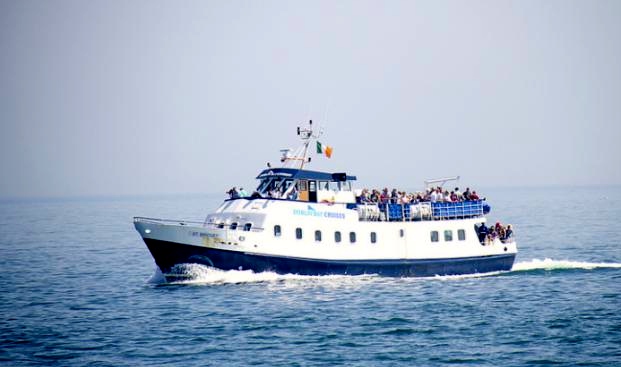 The Dublin Bay Cruise vessel St Brigid will run a ferry service from Dun Laoghaire to Howth on the Sunday morning
The Dublin Bay Cruise vessel St Brigid will run a ferry service from Dun Laoghaire to Howth on the Sunday morning
It’s that sort of off-the-wall yet actually very sound idea which gives us some idea of the thought which is going into this new Wave Regatta at Howth. You can do a lot of sailing in three days if everything is in place, and this team is determined that it will be.
Meanwhile, let’s hear it for the home squad, the new HYC Club Officers who were elected on Thursday night, and will have their agenda will filled throughout their time in office, as plans for 2018 include the establishment of a fully-fledged Sailing School within the club. They are: Commodore: Joe McPeake; Vice Commodore: Ian Byrne; Rear Commodore: Paddy Judge; Rear Commodore: Ian Malcolm; Hon. Secretary: Bernie Condy; Hon. Sailing Secretary: Caroline Koster; Honorary Treasurer: David Mulligan.
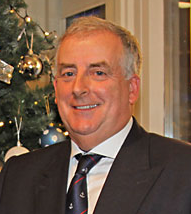 HYC Commodore Joe McPeake
HYC Commodore Joe McPeake



























